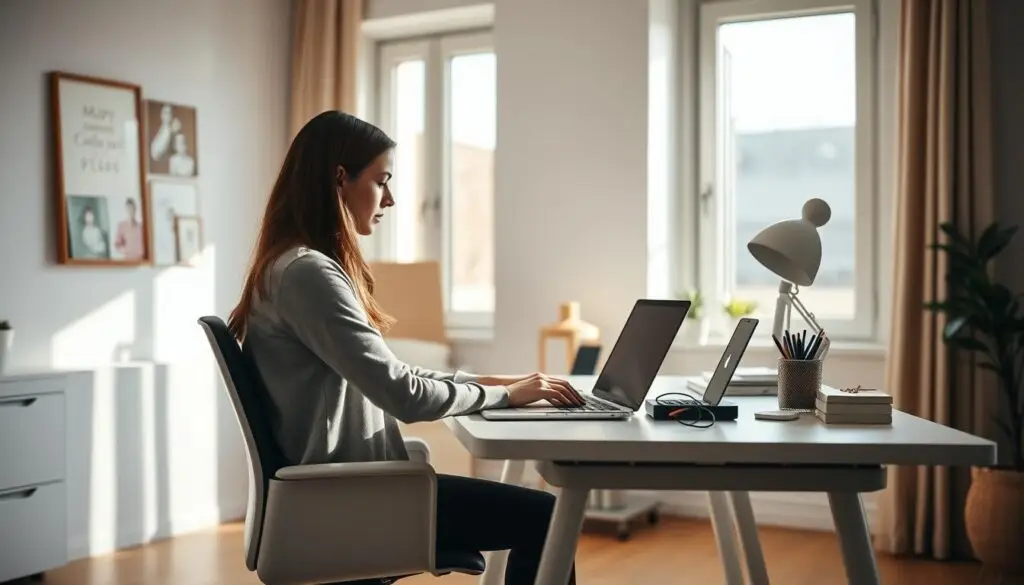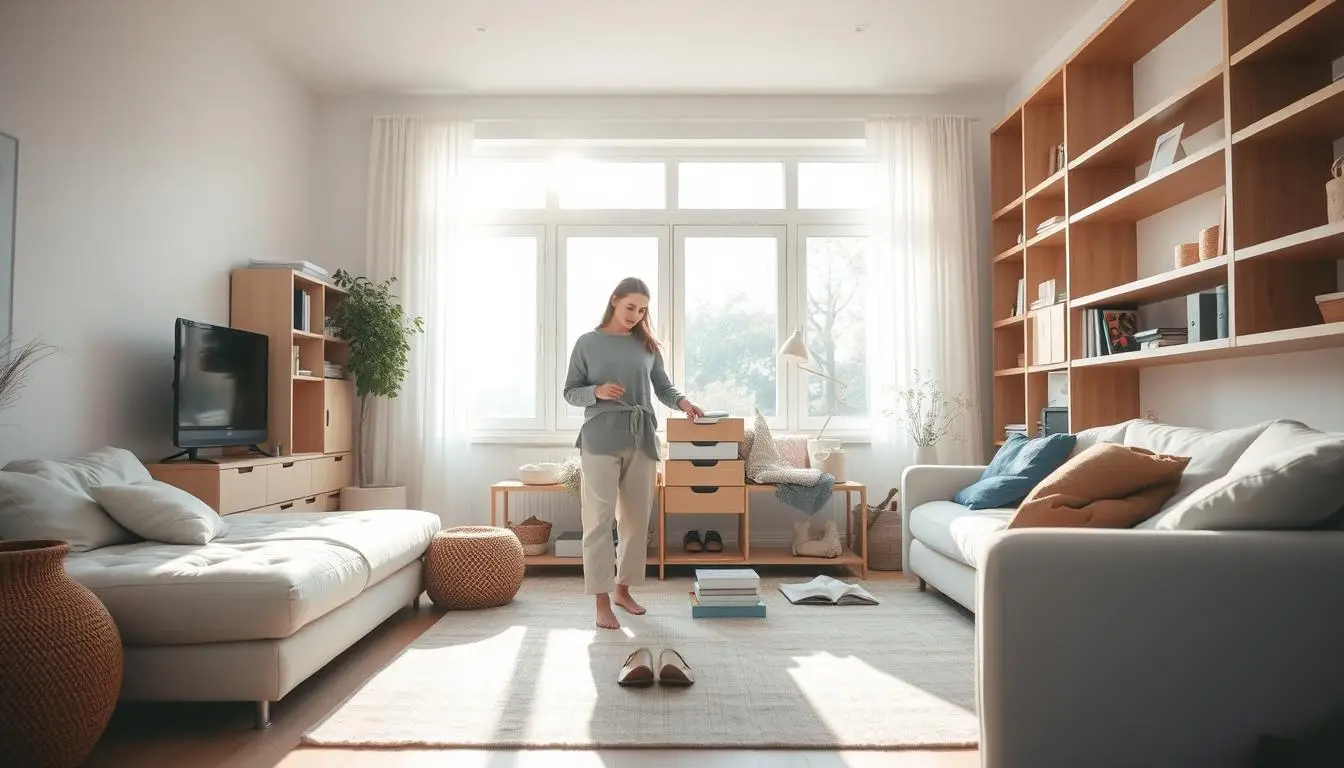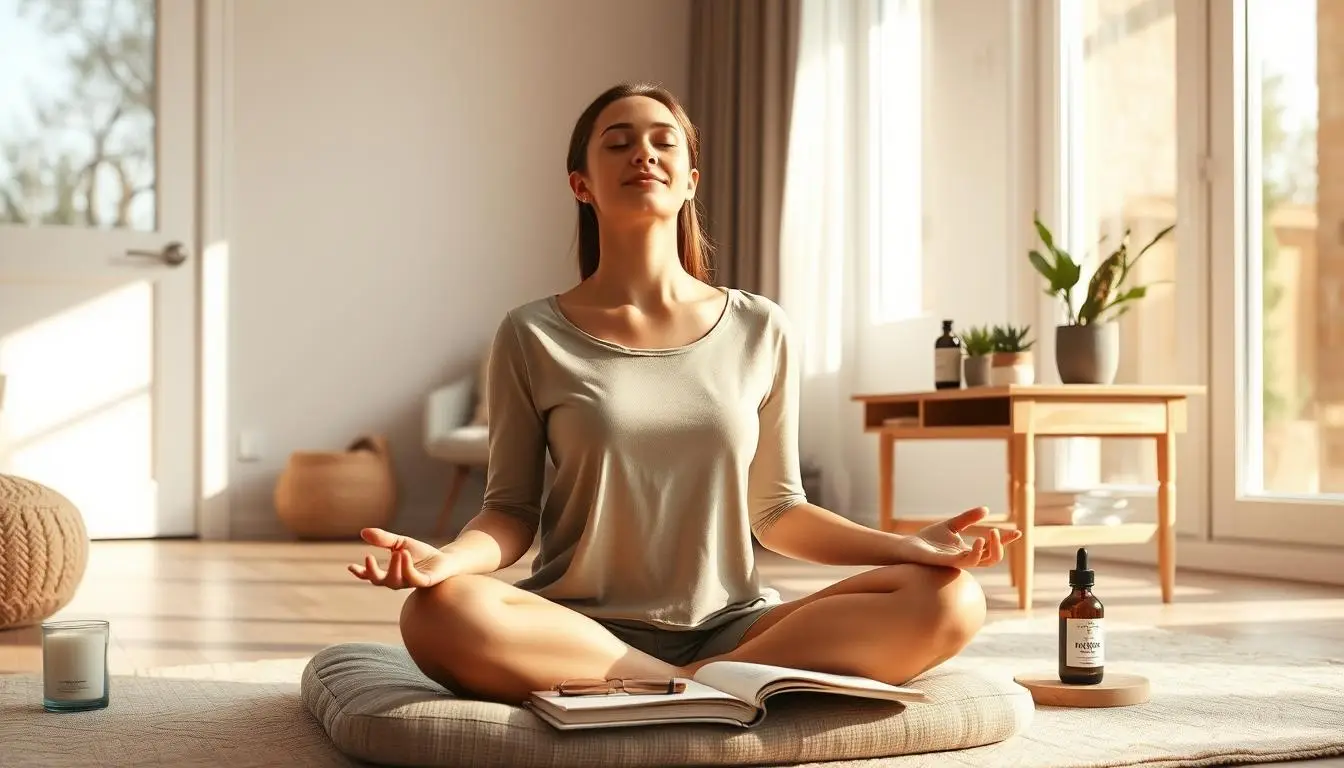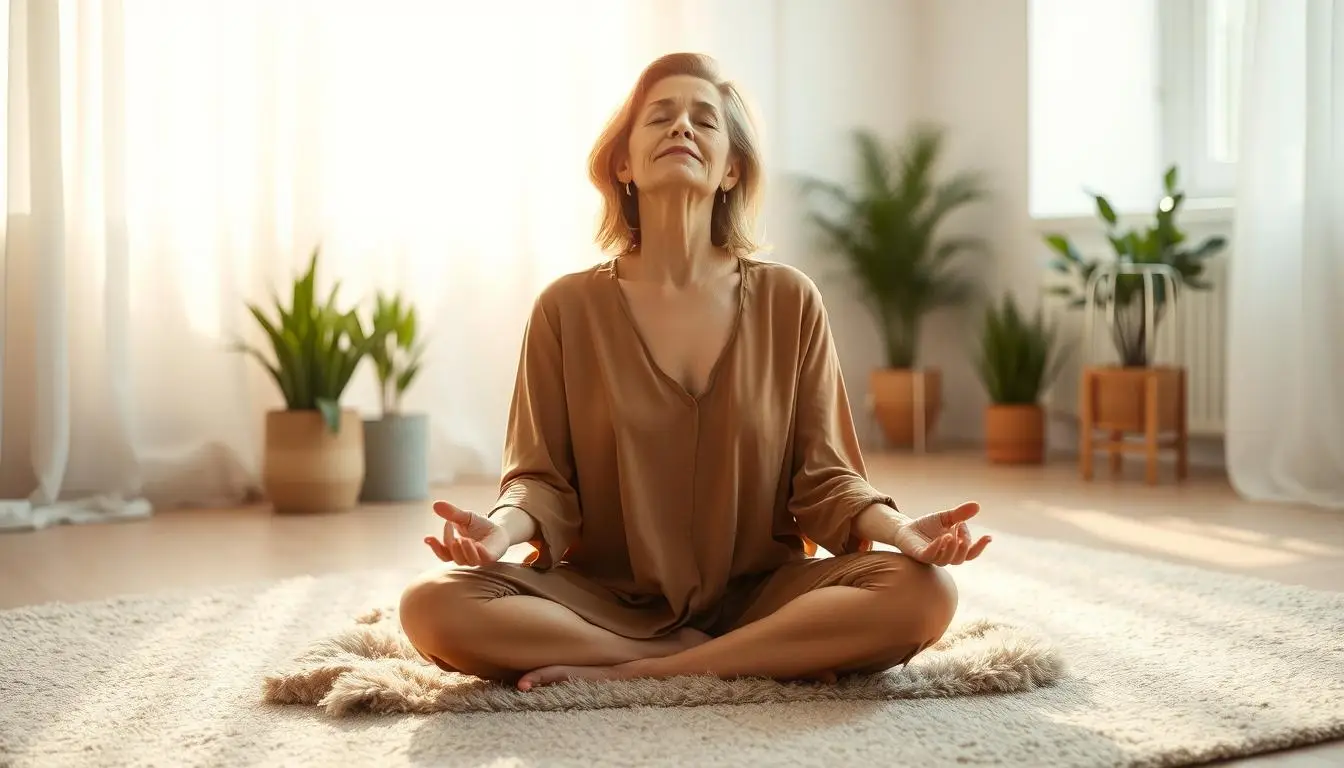Did you know the average American home has over 300,000 items? This shows how much clutter we have. It affects our mental health. So how do you improve mental clarify. By simplifying our spaces, we can feel less stressed and more focused.
In today’s world, we’re surrounded by too much. But, by simplifying, we can find peace. This article will show how a simpler life improves our mental health. We’ll give you tips on how to declutter your life.
Key Takeaways
- Clutter in our physical, digital, and mental spaces can negatively impact our mental well-being
- Embracing minimalism and decluttering can lead to reduced stress and increased focus
- Simplifying your environment involves minimizing possessions, creating designated spaces, and establishing routines
- Decluttering your digital life and simplifying your schedule can also contribute to improved mental clarity
- Cultivating a mindful mindset through practices like gratitude and self-reflection is essential for maintaining a simplified lifestyle
The Connection Between Environment and Mental Clarity
Your surroundings greatly affect your mental health and ability to focus. A messy environment can make you feel stressed and hard to concentrate. But, a clean space helps you feel calm and focused, boosting your productivity.
Research shows that people working in neat spaces have less stress hormones than those in messy ones. This shows how much your environment can influence your mind.
Having a simple environment does more than just reduce stress. It helps you focus on what’s important. This leads to better work and personal life satisfaction.
Let’s look at how a cluttered and a clean workspace compare:
| Cluttered Workspace | Clutter-Free Workspace |
|---|---|
| Difficulty finding necessary items | Easy access to essential tools |
| Constant visual distractions | Minimized distractions, allowing for better focus |
| Heightened stress levels | Reduced stress and improved mental clarity |
| Decreased motivation and productivity | Increased motivation and enhanced productivity |
Creating a clean living and working space improves your mental clarity and well-being. Next, we’ll share practical tips to help you get rid of clutter. This will help you enjoy the many benefits of a tidy space.
Identifying Areas of Clutter in Your Life
Clutter can show up in many parts of our lives, often without us noticing. By spotting where clutter builds up, we start simplifying and clearing our minds. Let’s look at the three main clutter types that might be slowing you down.
Physical Clutter
Physical clutter is stuff we own but don’t need. It fills our closets and countertops, making us feel overwhelmed. Look around and decide if each item is useful or brings joy. Let go of what you don’t need or use.
Digital Clutter
Today, clutter isn’t just physical. Our digital lives can get cluttered too. Think of full email inboxes and too many files. It’s exhausting to manage. Clean up your digital space by unsubscribing from emails and organizing your files.

Mental Clutter
Mental clutter is all the thoughts and worries in our heads. It’s hard to see and deal with because it’s invisible. Notice what’s always on your mind. Is it worries or negative thoughts? Start to clear your mind by tackling these issues.
Identifying physical, digital, and mental clutter is the first step to a simpler life. It’s not about being perfect. It’s about creating a space that supports your well-being and lets you focus on what’s important.
Benefits of Decluttering and Simplifying
Living without clutter can greatly improve your well-being. When you declutter your space, you’ll notice many benefits. These include better mental clarity and a calmer state of mind.
Decluttering helps reduce stress. Clutter can make you feel anxious and uneasy. By clearing your space, you create a peaceful area that encourages relaxation.
This peaceful environment can lead to better sleep and mental health.
Increased Focus and Productivity
A clean environment also boosts focus and productivity. When your space is organized, you can focus better. Using productivity hacks like specific work areas can help you stay focused and achieve your goals.
Improved Mood and Well-being
Decluttering your life goes beyond just your space. It also means clearing your schedule for what’s important. This can make you feel more fulfilled and happy.
By focusing on self-care and meaningful relationships, you improve your mood. Adding mental health tips like mindfulness can also help.
Decluttering and simplifying have many benefits for your mental and physical health. By organizing your space, you open the door to a clearer mind and a happier life.
How to Simplify Your Physical Space
Making your space simpler is key to clear thinking and a clutter-free life. By cutting down on stuff, setting up special areas, and keeping a cleaning schedule, you can turn your space into a calm and organized place. This place will help you feel better and work better.

To start simplifying your space, look at what you own and decide what’s useful or brings you joy. Be real with yourself and get rid of things you haven’t used in a while or that just add to the mess. You can donate, sell, or recycle these items to free up space and lessen the amount of stuff you have.
Minimizing Possessions
Thinking like a minimalist helps keep your space tidy. Focus on having a few high-quality items instead of lots of cheap ones. This way, your space will be more organized and useful. Here are some tips for cutting down on stuff:
- Follow the “one in, one out” rule: For every new thing you get, get rid of an old one you don’t need or use.
- Regularly declutter by setting aside time each month to go through your stuff and decide what to give away or throw away.
- Avoid buying things on impulse and think carefully if something really adds value to your life before you buy it.
Creating Designated Spaces
Having specific areas for different activities helps keep your home organized and purposeful. By having a place for everything, you can avoid clutter and find what you need easily. Here are some ideas for setting up special spaces:
| Space | Purpose | Key Elements |
|---|---|---|
| Home Office | Work and productivity | Desk, comfortable chair, storage for supplies |
| Reading Nook | Relaxation and learning | Cozy seating, bookshelf, good lighting |
| Meditation Corner | Mindfulness and self-care | Comfortable cushion, calming décor, natural light |
Establishing a Cleaning Routine
Keeping your space tidy needs regular effort and dedication. By having a cleaning schedule, you can stay ahead of clutter and prevent it from building up. Here are some tips for a good cleaning routine:
- Break tasks into smaller parts and assign them to specific days of the week.
- Set aside time each day for tidying up and putting things back where they belong.
- Get everyone in your household to help with cleaning and share the work.
By using these methods to simplify your space, you can make an environment that helps your mind stay clear and supports your well-being. Remember, decluttering and minimalism are ongoing journeys. Be patient and keep up the effort to keep your clutter-free living space.
Decluttering Your Digital Life
In today’s digital world, it’s easy to build up digital clutter without noticing. Your email inbox can overflow, and your computer can be filled with files. Simplifying your digital life can help you focus better and feel better overall.
Begin by organizing your digital files and folders. Make a system that fits your needs, like by project or date. Use clear names for your files and folders. Also, consider using cloud storage to access your files from anywhere and save space on your devices.

Then, tidy up your online accounts. Unsubscribe from emails you don’t want. Delete unused accounts and merge others when you can. Use a password manager to keep your login info safe.
To cut down on distractions and boost focus, try these tips:
- Turn off notifications for apps and emails you don’t need
- Use website blockers to limit time on distracting sites
- Set specific times to check email and social media
- Keep your computer desktop tidy and organized
Here’s a quick look at the difference between a cluttered and simplified digital life:
| Cluttered Digital Life | Simplified Digital Life |
|---|---|
| Overflowing inbox | Organized and streamlined inbox |
| Files scattered across devices | Centralized and organized file system |
| Constant notifications and distractions | Intentional and focused digital habits |
By cleaning up your digital space, you can make your life more peaceful and productive. Enjoy the calm and clarity that comes with a simplified digital environment.
Simplifying Your Schedule and Commitments
In today’s fast world, it’s easy to get overwhelmed. An overloaded schedule can cause stress and burnout. By simplifying your schedule, you can improve your well-being and achieve life simplification.

Prioritizing Important Tasks
The first step is to identify and prioritize important tasks. Make a list of your daily, weekly, and monthly commitments. Then, assess their value against your goals and values. Use a prioritization matrix to guide your decisions:
| Urgency | High Importance | Low Importance |
|---|---|---|
| High | Do it now | Delegate or schedule |
| Low | Schedule for later | Eliminate |
Learning to Say No
Learning to say no is key to simplifying your life. It’s okay to decline non-essential commitments. Saying no to something means saying yes to something more important, like self-care or pursuing your passions.
Creating Time for Self-Care
Making time for self-care is vital for your mental health. Set aside time each day or week for activities that relax and recharge you. Some ideas include:
- Meditation or mindfulness practices
- Exercise or yoga
- Reading a book or listening to music
- Spending time in nature
- Engaging in a hobby or creative pursuit
By simplifying your schedule and making time for self-care, you can reduce stress and improve mental clarity. Remember, mental health tips like these can help you achieve your goals and live a more fulfilling life.
Cultivating a Mindful Mindset
To achieve mental clarity, it’s key to simplify your surroundings and digital life. Mindfulness means being fully present and aware of your thoughts and feelings. By adding mindfulness to your daily life, you can lower stress, boost focus, and enjoy a simpler life more.

Practicing Gratitude
Gratitude is a strong mindfulness practice. Reflecting on what you’re thankful for each day can help you focus on what you have, not what you lack. You can start a gratitude journal or share thanks with others. Here are some ways to practice gratitude:
- Write down three things you’re grateful for each morning or evening.
- Thank someone who has positively impacted your life.
- Enjoy the small joys of the day, like a beautiful sunset or a tasty meal.
Studies show that gratitude boosts happiness, improves sleep, and strengthens relationships. By making gratitude a habit, you can see the world in a more positive light and find happiness in simplicity.
Embracing Minimalism
Minimalism is also part of a mindful mindset. It’s about getting rid of what you don’t need and focusing on what’s important. Minimalism helps clear your mind and find purpose. Here are some benefits:
| Benefit | Description |
|---|---|
| Increased Focus | With fewer distractions, you can focus better on what’s important. |
| Greater Freedom | Letting go of material things can feel freeing. |
| Enhanced Creativity | A simpler space can spark new ideas and inspiration. |
Minimalism doesn’t mean having nothing. It’s about choosing what’s truly important to you. By focusing on the essentials, you make room for what brings you joy and fulfillment.
Practicing gratitude and minimalism can greatly improve your mental clarity and happiness. Being present, thankful, and intentional can reduce stress, improve focus, and lead to a more fulfilling life.
How to Simplify Your Environment Can Lead to Improved Mental Clarity
Living a simpler life can greatly improve your mental health. By simplifying your life, you make room for clearer thinking and peace. Decluttering your surroundings, digital life, and thoughts can lower stress and boost focus.
One big plus of a tidy environment is less distraction. A clean home lets you concentrate better without clutter getting in the way. Organizing your digital space, like files and emails, also keeps your mind clear.
By simplifying your schedule, you have more time for things that make you happy. Saying no to things you don’t need helps you stay balanced. This balance leads to better mental clarity and happiness.
Being mindful is key to a simpler life. Gratitude, minimalism, and living in the moment help keep your mind sharp. Letting go of stuff and mental clutter lets you grow and connect with others.
In short, making your environment simpler is a smart move for clearer thinking. By cleaning up your space, focusing on what’s important, and being mindful, you can feel less stressed and more focused. This leads to a more balanced and joyful life.
Maintaining a Simplified Lifestyle
Choosing a clutter-free life boosts your mental clarity. Yet, keeping a minimalist lifestyle is a continuous challenge. It’s vital to regularly check your surroundings and set firm limits.
Decluttering should become a regular habit. Allocate time each week or month to go through your stuff. Look for items that don’t have a purpose or make you happy. This way, you avoid clutter and keep your space tidy.
“The first step in crafting the life you want is to get rid of everything you don’t.” – Joshua Becker
Regularly Reassessing and Decluttering
Keeping your living space clutter-free means regular checks and decluttering. Here are some helpful tips:
- Plan decluttering sessions, like once a month or with the seasons
- Adopt the “one in, one out” rule: add something new, remove something old
- Think about each item’s usefulness and emotional value before keeping it
Setting Boundaries and Sticking to Them
Setting and keeping boundaries is key to a simple life. This rule applies to things you own, commitments, and relationships. Here are some suggestions:
- Practice saying “no” to things that don’t fit your priorities or values
- Set limits with family and friends on gifts and stuff
- Be careful with the time and energy you spend on people and activities
By regularly checking your space and setting clear limits, you can keep a simple life. This approach helps you stay mentally clear and enjoy better overall well-being.
The Role of Self-Reflection in Simplifying Your Life
Starting your journey to simplify your life and boost mental clarity involves self-reflection. It’s important to look at your values, priorities, and habits. This helps you find where simplifying can improve your well-being and peace of mind.
Start by asking yourself important questions. What’s truly important to you? What makes you happy and fulfilled? Are there things, activities, or commitments that make you feel drained or stressed?
By honestly looking at your life, you can make choices that match your values and goals. This is the first step towards a simpler life.
Practicing mindfulness helps you understand yourself better. Spend a few minutes each day just sitting and noticing your thoughts and feelings. This can help you see patterns or habits that add clutter and complexity to your life.
Reflecting on your life can show you the benefits of living simply. A simpler life often means less stress, more focus, and happiness. By letting go of what’s not important, you make room for what truly matters – like meaningful relationships, personal growth, and activities that make you happy.
Remember, simplifying your life takes time and patience. Be kind to yourself as you make progress. Every decision to declutter, prioritize, or let go brings you closer to a clearer and more fulfilling life.
Inspiring Success Stories of Simplification and Mental Clarity
Exploring the benefits of decluttering, minimalism, and simplifying life is inspiring. Real-life examples show how these practices can change lives. They remind us of the good effects on our mental health.
Real-Life Examples
Joshua Becker, a well-known minimalist blogger, started his journey with a cluttered garage. He realized it was wasting time with his family. By decluttering, Becker found clarity and purpose.
Courtney Carver, creator of Project 333, simplified her wardrobe to 33 items for 3 months. She found less stress, more productivity, and happiness in living with less.
“Minimalism is the intentional promotion of the things we most value and the removal of anything that distracts us from it.” – Joshua Becker
Lessons Learned
These stories teach us about simplification’s impact on mental clarity. Key lessons include:
- Decluttering our space can clear our minds
- Focus on what matters for purpose and fulfillment
- Minimalism reduces stress and boosts productivity
- Simplifying life makes us more present and engaged
By learning from these examples, we can also find mental clarity and well-being. Remember, simplifying your life is a personal journey. But the benefits are worth the effort.
FAQ
Q: What does it mean to declutter your life?
A: Decluttering means getting rid of excess items—both physical and mental—that compete for your attention. It’s about creating a clear mindset that fosters mental clarity and reduces anxiety.
Q: How can I boost my mental health with minimalism?
A: Embracing minimalism can boost your mental health by reducing overwhelm and fostering a sense of calm. It allows you to focus on what truly matters without the distractions of a cluttered environment.
Q: What are some ways to simplify my life while reducing stress and anxiety?
A: There are many ways to simplify your life! Start by decluttering your physical space, minimizing your to-do list, and practicing mindfulness. These steps can significantly reduce stress and promote mental clarity.
Q: Why is a cluttered environment linked to a cluttered mind?
A: A cluttered environment can lead to a cluttered mind because physical clutter can increase stress and compete for your mental energy. When you clear your space, you also clear your thoughts!
Q: What’s the first step toward embracing minimalism?
A: The first step toward embracing minimalism is to assess your current lifestyle and identify what truly adds value to your life. Start small by decluttering one area at a time to avoid feeling overwhelmed.
Q: How does mindfulness play a role in simplifying life?
A: Mindfulness promotes mental clarity by encouraging you to focus on the present moment. This practice helps you identify unnecessary distractions and fosters a sense of control, making it easier to simplify your life.
Q: Can reducing digital distractions help simplify my life?
A: Absolutely! Reducing digital distractions is a powerful way to simplify your life. By limiting the noise from social media and other digital clutter, you can enhance your focus and mental resilience.
Q: What psychological impact can minimalism have on my daily routine?
A: Minimalism can have a profound psychological impact by reducing anxiety and fostering a clear mindset. This way of living promotes mental clarity and helps you prioritize what’s truly important in your daily routine.
Q: How can I create a sense of control in a chaotic world?
A: To create a sense of control, start by implementing ways to simplify your life, such as decluttering your physical and mental spaces. Establishing a manageable to-do list can also help you feel more organized and in charge.
Q: Are there any tips for maintaining a minimalist lifestyle?
A: To maintain a minimalist lifestyle, regularly assess your belongings and habits. Commit to a “one in, one out” policy, limit your to-do list, and continuously practice mindfulness to keep clutter at bay and support mental clarity.
Conclusion
We’ve looked at how simplifying your life boosts mental clarity. By clearing out physical, digital, and mental clutter, you make space for focus and less stress. Embracing minimalism helps you enjoy life’s simple things and live more mindfully.
Remember, making your life simpler is a journey, not a quick fix. It needs ongoing effort and a fresh look at what’s important. By setting limits, saying no when needed, and caring for yourself, you keep your life simple and your mind clear.
Start today by picking one area to simplify. It could be tidying up your workspace, cutting down on emails, or dropping a commitment that’s holding you back. Small steps can make a big difference in your mental clarity. Let simplicity change your life for the better.








